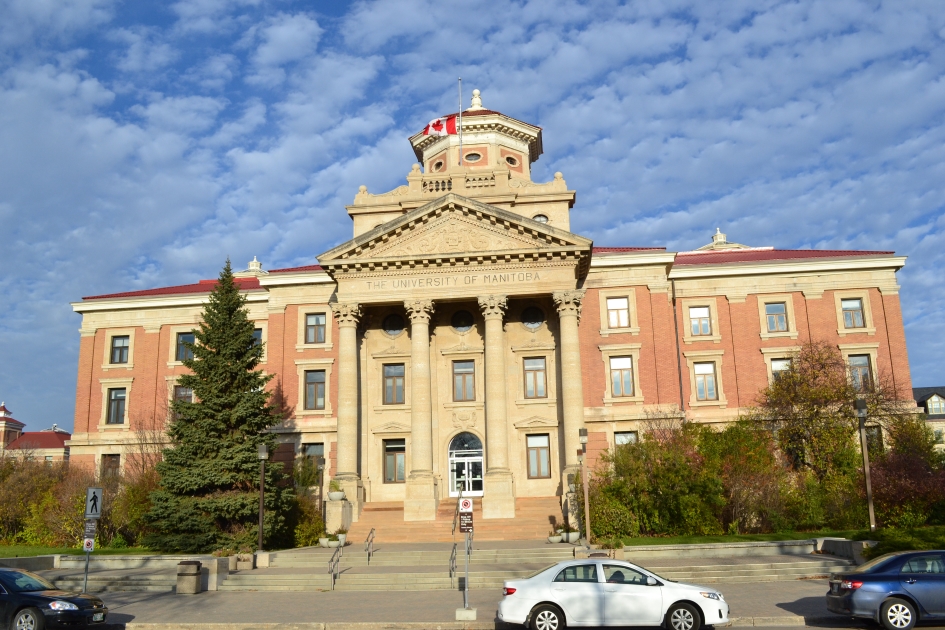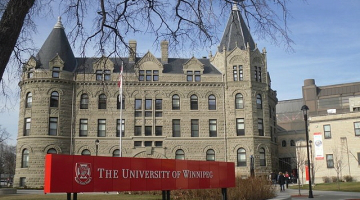Study in Manitoba
Manitoba offers international students the opportunity to access world-class education with affordable tuition fees.
Higher education in Manitoba is heavily concentrated in the provincial capital and largest city, Winnipeg, where more than half the population of Manitoba resides.
Graduating from a Manitoba educational institution provides individuals with an internationally recognized degree, diploma, or certificate and the opportunity to work and immigrate after graduation.

Got a question about studying in Manitoba? Our comprehensive Studying in Manitoba FAQ page has the answers. If your question is not included, please contact us today and submit your question.
Population
1.3 million
International Student Population
7,644 (2014 figures)
Location

Main Study Destination
Winnipeg
Studying in Manitoba: The Advantages
Tuition Rebates
In addition to having some of the most affordable tuition and living costs in the country, Manitoba offers a 60% tax rebate on certain post-secondary fees to individuals who work in the province after graduation.
Subsidized Health Care for Canadian-born Minor Children
Canadian-born children of international students (who meet the other residency requirements outlined in the Manitoba Health Services Insurance Act) are eligible for provincial health insurance in Manitoba. Similarly international students who also hold a work permit with a year or more validity, or who have a study permit that allows them to work in Canada for 12 consecutive months or longer, are also eligible for provincial health insurance.
A Growing Jobs Market
The government of Manitoba has projected that a total of 177,800 new job openings will be created in the province between 2015 and 2021, with the unemployment rate expected to decline from 5.5% to 4.9% over the same period. Personal incomes are also expected to increase by an average of 4.6% annually.
Low Cost of Living
Manitoba’s low cost of living allows residents to live better for less, with housing costs among the lowest in Canada.
Immigrate After Studying in Manitoba
The Manitoba Provincial Nominee Program (MPNP)
Under the Skilled Workers in Manitoba category of the MPNP, applications are accepted from qualified temporary foreign workers and international student graduates who are currently working in Manitoba and have been offered a permanent job with their Manitoba employer. Combined with the positive labour market forecast, this makes studying in Manitoba an attractive long-term option for individuals who wish to make Canada their permanent home.
Express Entry
Candidates for immigration to Canada through the federal Express Entry immigration selection system who have completed their education at a school in Manitoba may be awarded a significant number of points on account of their high level of education. Moreover, international graduates of Canadian educational institutions may have obtained important Canadian work experience, another highly valued factor under the Express Entry system.
Destination Schools in Manitoba
These institutions are featured due to their size, proximity to urban centres, and tradition for enrolling international students into their student bodies. Learn more about each school by clicking their titles below, which will take you to the relevant page on School Search.
The University of Manitoba
The University of Manitoba has been ranked number one in Canada for its outstanding student services, and is renowned for enabling international students. The U of M is internationally recognized as an innovator in research and technology.
Signature programs: Actuarial science, Architecture, Engineering, Law, Pharmacy
Location: Winnipeg

The University of Winnipeg
Maclean's magazine recognizes the University of Winnipeg as one the top Canadian undergraduate schools for student satisfaction, with much of this owed to an incredible array of state-of-the-art facilities and student services.
Signature programs: Theatre and film, Kinesiology, Bio-anthropology
Location: Winnipeg

Other Select Schools in Manitoba
Select Schools are those that CanadaVisa has assessed for quality, value, and competency with international students. These schools are accredited by Colleges and Institutes Canada (formerly the Association of Community Colleges of Canada) or are chosen because of proven pathway programs and exemplary student services.
In order to apply for a Canadian study permit, prospective international students must first obtain a letter of acceptance from a Designated Learning Institution (DLI). As each institution may have different admission requirements and application processes, interested applicants may contact the desired institution(s) individually. Find out more about studying in Manitoba.
For a full list of DLIs by province, click here.
- The University of Winnipeg ranks high for student satisfaction, particularly among undergraduates. Located in downtown Winnipeg, many of its courses and programs involve projects in the community. The University of Winnipeg has also invested heavily in state-of-the-art facilities for athletics and contemporary art.
- Signature programs: Theatre and Film, Kinesiology, Bio-anthropology, Marriage and Family Therapy
- The University of Manitoba, also in Winnipeg, has a strong academic reputation, having produced 97 Rhodes scholars. It also cares about student experience, and has been ranked number one for its outstanding student services.
- Signature programs: Actuarial Mathematics, Architecture, Engineering, Law, Pharmacy
- Brandon University is the only university in Manitoba located outside Winnipeg, in the province’s second-largest city, Brandon. The university also offers one of the cheapest tuition rates for international students in Canada.
- Signature programs: Nursing, Education, Music
- Signature programs: Network Security, Restaurants and Food Services, Entrepreneurship Diploma Program, University preparation
- Assiniboine Community College emphasizes apprenticeship, continuing education, and contract training. It is particularly well-known in the province for its delivery of practical nurse training. The college’s practical approach to teaching pays off — according to a 2014 report, 93% of graduates found a job in their field within six weeks of graduating. While the number of international students attending each year is small, the college still offers tailored student services and support. In conjunction with Brandon University, the college also offers a 2+2 program to spend two years at each institution.
- Signature programs: Nursing, Culinary Arts, Network Administration Technology, Business Administration
- Manitoba’s universities and colleges also offer a broad range of specialized engineering study programs.
- As the healthcare and natural resources sectors employ many thousands of workers, these are also popular study areas.
- In addition to the programs above, institutions across Manitoba offer a broad range of programs.
Tuition for international students varies widely, depending on the institution and study program. International students in Manitoba may expect to pay between $11,000-$13,000 per year at a college, and $13,000-$19,000 per year at the undergraduate level at a university. Language school and graduate school tuition may differ significantly.
As of September 1st, 2018 International students (holding a valid study permit issued by IRCC) are no longer eligible for health insurance coverage from Manitoba Health. While this applies to most international students in the province, it does not mean that all international students are ineligible for provincial health insurance—as the province will give consideration based on an individual's situation, and if they meet eligibility requirements. For example, healthcare may be available to study permit holders who:
- Have a work permit, or who have a spouse who is currently in Canada on a work permit with a year or more of validity; or
- Have a study permit that allows them to work in Canada for 12 consecutive months or longer.
Provincial health insurance is also available to Canadian-born dependant children of international students.
International students who don't meet the above stipulations are encouraged to explore private healthcare options, either through the educational institutions or through private health insurance providers to ensure sufficient coverage for their healthcare needs.
In order to apply for a study permit, a potential international student must show that he or she has $10,000 in addition to tuition fees to cover living expenses in Manitoba. This equates to $833 per month.
Below is an approximate estimate of the cost of living for students in Winnipeg. Average cost of living can vary between rural and urban locations. Estimate may also vary depending on the type of accommodation and the type of study program. The University of Manitoba also estimates that new students may spend $600-$1000 on appropriate winter clothing, as a one-time expense.
| Factor | Per month (approx.) | Per year (approx.) |
|---|---|---|
Accommodation (single, off-campus) | $700 | $8,400 |
| Food | $225 | $2,700 |
| Clothing, miscellaneous | $150 | $1,800 |
| Recreation and entertainment | $150 | $1,800 |
| Health and Dental Insurance | $25 | $300 |
| Transportation (Winnipeg price) | $70 | $840 |
| Phone bill | $60 | $720 |
| Internet | $50 | $600 |
| Utilities | $80 | $960 |
| Cost of living total | $1,510 | $18,120 |
International students in Manitoba may have access to private loans on the same terms as Canadian citizens and permanent residents. Loans may be offered by banks, student organizations, or other groups. It is important to properly research loan options, and understand the interest and repayment plans, before committing to any contract.
Many organizations and institutions may offer scholarships or bursaries to international students studying in Manitoba. For more information, students are encouraged to contact the international student services department of their institution.
Graduate programs in particular often have funding options for students pursuing a Master’s or PhD program. It is important to contact the educational institution directly for more information.
- Engineering is a popular study program across Canada. In Manitoba, the University of Manitoba and Red River College of Applied Arts and Technology are known for their Engineering programs.
- The University of Manitoba offers degree programs in Civil, Biosystems, Computer, and Mechanical Engineering. Students may choose from over 25 specializations at the undergraduate, Master’s, and PhD Level.
- Red River College offers several engineering technology programs which specialize in areas such as computer-aided design, geographic information systems, environmental protection, and geomatic technologies.
- Computer science, computer engineering and computer technology programs are popular across Canada. Different institutions in Manitoba offer a variety of program specializations in Computer Science and technology.
- The University of Winnipeg’s Applied Computer Systems Bachelor program offers specializations in Health Informatics and Information Systems; students may build a software project for a local organization as a final project
- The Manitoba Institute of Trades and Technology offers courses specializing in network security, cloud administration, and cyber defence.
- Assiniboine Community College is known for its nursing programs. It offers six programs in the field of healthcare, including Practical Nursing and Palliative Care.
- Brandon University offers Bachelor degree programs and certificates in healthcare field. Students may pursue a Bachelor of Nursing or a Bachelor of Science in Psychiatric Nursing, as well as a Master of Science in Psychiatric Nursing and pre-professional programs in various health-related fields.
- The University of Manitoba’s Bachelor of Nursing program offers a course focusing on nursing practice in culturally diverse societies, which may include a tour to China.
STEM is an acronym for Science, Technology, Engineering, and Mathematics. While careers in STEM fields are popular, there is no specific program entitled “STEM” in a Manitoba college or university. Prospective students are encouraged to research programs in their particular area of interest. Use the School Search tool to research programs in these fields.
Job creation in the province is growing: the government of Manitoba has projected that a total of 177,800 new job openings will be created between 2015 and 2021, with the unemployment rate expected to decline from 5.5% to 4.9% over the same period.
The healthcare industry is the biggest employer in Manitoba. There has also been growth in the professional, scientific and technical services and finance, utilities, and natural resources sectors between July 2015 and September 2016.
- Learn more about the economy and employment in Manitoba.
- Use the Canada Job Search Tool to look for open positions across Manitoba and Canada.
Graduates from a DLI in Manitoba may apply for the Post-Graduation Work Permit after graduating from an eligible study program.
Under the Skilled Workers in Manitoba category of the Manitoba Provincial Nominee Program (MPNP), applications are accepted from qualified temporary foreign workers and international student graduates who are currently working in Manitoba and have been offered a permanent job with their Manitoba employer. Combined with the positive labour market forecast, this makes studying in Manitoba an attractive long-term option for individuals who wish to make Canada their permanent home.
International graduates may also pursue an application for permanent residence through the federal Express Entry immigration system. Candidates for immigration to Canada who have completed their education at a school in Manitoba may be awarded points on account of their high level of education. Moreover, international graduates of Canadian educational institutions may have obtained important Canadian work experience, another highly valued factor under the Express Entry system.
Manitoba is such a big province that climate differs significantly throughout. In general, winters are among the coldest in Canada, and summers are hot. The province ranks second in Canada for sunniest province year-round, and first for clearest skies.
In addition to having some of the most affordable tuition and living costs in the country, Manitoba offers a 60% tax rebate on certain post-secondary fees to individuals who work in the province after graduation.
Manitoba may be a good choice for international students with families. In addition to the opportunity to avail of public health care after six months, individuals studying in Manitoba on a study permit with dependent children may, under certain conditions, receive subsidized public school education for their children.
Housing costs — including rent prices — in Manitoba are among the lowest in Canada.
- Winnipeg is the province’s only major urban centre, with over half the provincial population living within the city’s bounds. Its economy is one of the most diversified in Canada, with major employment in the trade, manufacturing, educational services, and health care and social assistance sectors.
- Brandon is the second-largest city in Manitoba, and is increasingly becoming known for its educational services. With a lower average age and a lower average housing cost than the Canadian average, the city proves popular with young workers and families.

